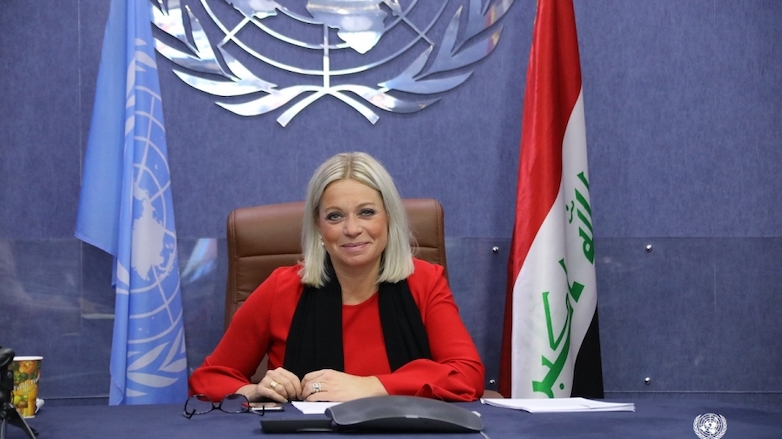UN calls on Iraq to deliver salaries of public servants in Kurdistan Region

ERBIL (Kurdistan 24) – In her briefing to the UN Security Council on Tuesday, the Special Representative to the Secretary-General for the United Nations Assistance Mission for Iraq (UNAMI), Jeanine Hennis-Plasschaert, called on the Iraqi government to protect public servants in the Kurdistan Region from political disputes and deliver their salaries.
Hennis-Plasschaert outlined the recent political developments in Iraq in her speech to the Security Council, admitting that the economic situation in the country “remains troubling.”
Iraq’s economy, and indeed that of the Kurdistan Region, has suffered in recent years due to the global fall in oil prices, the war against the so-called Islamic State, and now the COVID-19 pandemic.
In an attempt to weather the remaining financial storm of 2020, the central government in Baghdad has introduced a controversial borrowing law, which lawmakers from the Kurdistan Region opposed.
Erbil-Baghdad relations
In her statement to the Security Council, Hennis-Plasschaert reminded that the recent dispute in the Iraqi Parliament demonstrates “how brittle” the relationship between Baghdad and Erbil is, calling on both sides to work together to find solutions.
Leaders from the Kurdistan Region have led efforts in recent years to meet with their Iraqi counterparts and discuss a range of possible solutions to their differences. Most of the issues between the two stem from Iraq’s inability to uphold its constitution properly—a point Hennis-Plasschaert emphasized as she said, “constructive negotiations between Baghdad and Erbil are hampered by unclear constitutional guidance.”
Iraq’s new borrowing law directly affects public servants in the Kurdistan Region, and Hennis-Plasschaert reminded the Security Council that “a Kurdish region public servant is not only a Kurdish region public servant: she or he is also an Iraqi citizen.”
“The payment of public servants should be shielded from political disputes, they cannot and should not be collectively victimized,” she continued. “A solution is urgent, and political will to find a way out will—once more—be of greatest importance.”
The UN representative called for an urgent agreement between the regional and central governments to find ways “on how to enhance the federal system.”
“With many other pressing issues on their plate, Iraq’s leaders and politicians may be tempted to ignore this issue,” she warned, “but the bitter truth is: as long as no lasting solutions are found, the relationship will not get any better. On the contrary.”
Praise for ‘hard-won agreement’ on Sinjar
In another part of her briefing, Hennis-Plasschaert highlighted the “hard-won” agreement that Erbil and Baghdad signed to normalize the situation in Sinjar (Shingal) and reconstruct the region.
On Oct. 9, the Iraqi government and the Kurdistan Regional Government (KRG) announced they had reached an agreement to stabilize the situation in Shingal, where competing armed groups are active.
Read More: KRG and Baghdad reach administrative, security agreement on Sinjar
Hennis-Plasschaert called the deal “an important agreement” that “could pave the way for a new chapter for Sinjar, for all Sinjaris.”
“Swift, decisive, and well-coordinated implementation will now prove essential. Stable security structures are priority number one, followed by a unified administration,” she concluded.
Editing by Karzan Sulaivany
